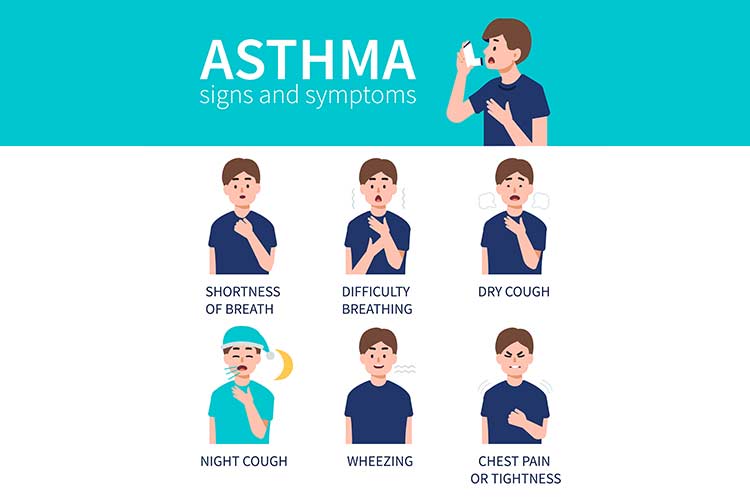
Asthma is a chronic condition affecting millions of people worldwide, characterized by inflammation and narrowing of the airways, leading to difficulty breathing. The key to managing asthma effectively lies in a combination of medications, lifestyle adjustments, and preventive measures. This blog explores the most successful treatments for asthma, providing a comprehensive overview of both pharmacologic and non-pharmacologic strategies. Buy asthalin inhaler and Aerocort Inhaler is used to relieve symptoms of asthma and chronic obstructive pulmonary disease (COPD) such as coughing, wheezing and breathlessness.
Understanding Asthma:
Before diving into treatments, it’s crucial to understand asthma’s underlying mechanisms. Asthma involves inflammation of the airways, which can lead to bronchoconstriction, excessive mucus production, and airway hyperreactivity. Common symptoms include wheezing, shortness of breath, chest tightness, and coughing, particularly at night or early in the morning.
Pharmacologic Treatments:
- Inhaled Corticosteroids (ICS)
Inhaled corticosteroids are the cornerstone of asthma management. They work by reducing inflammation in the airways, thereby decreasing the frequency and severity of asthma attacks. Common ICS medications include:
- Fluticasone propionate (Flovent)
- Budesonide (Pulmicort)
- Beclometasone dipropionate (Qvar)
These medications are typically used daily and are considered a long-term control strategy. They do not provide immediate relief but are essential for maintaining asthma control over time.
- Long-Acting Beta-Agonists (LABAs)
LABAs are bronchodilators that help open the airways and make breathing easier. They are usually combined with ICS for better control of asthma symptoms. Notable LABAs include:
- Salmeterol (Serevent)
- Formoterol (Foradil)
It’s important to note that LABAs should never be used as a sole treatment for asthma; they must be paired with ICS to avoid worsening asthma control.
- Leukotriene Receptor Antagonists (LTRAs)
LTRAs are oral medications that block the action of leukotrienes, substances in the body that contribute to inflammation and bronchoconstriction. They are often used as an add-on therapy for patients who do not achieve adequate control with ICS alone. Examples include:
- Montelukast (Singulair)
- Zafirlukast (Accolate)
These medications can also help with exercise-induced asthma and allergic asthma.
- Short-Acting Beta-Agonists (SABAs)
SABAs are used for quick relief of asthma symptoms during an acute asthma attack. They work by relaxing the muscles around the airways, providing rapid, short-term relief. Common SABAs include:
- Albuterol (Ventolin, ProAir)
- Levalbuterol (Xopenex)
SABAs are not intended for long-term management but are crucial for immediate symptom relief.
- Biologic Therapies
Biologics are a newer class of asthma medications designed for patients with severe asthma who do not respond well to standard treatments. These drugs target specific molecules involved in the inflammatory process. Examples include:
- Omalizumab (Xolair): Targets IgE, reducing allergic responses.
- Mepolizumab (Nucala): Targets interleukin-5 (IL-5), a key player in eosinophilic inflammation.
- Dupilumab (Dupixent): Targets IL-4 and IL-13, which are involved in inflammation.
Biologics are typically administered via injection and are used in conjunction with other asthma medications.
Non-Pharmacologic Treatments and Lifestyle Adjustments:
- Allergen Avoidance
Identifying and avoiding asthma triggers is crucial for effective asthma management. Common triggers include pollen, dust mites, mold, pet dander, and smoke. Strategies for allergen avoidance may include:
- Using air purifiers to reduce indoor allergens.
- Regular cleaning to minimize dust and mold.
- Keeping pets out of the bedroom and maintaining pet hygiene.
- Asthma Action Plan
An asthma action plan is a personalized document created with your healthcare provider. It outlines how to manage asthma daily, how to recognize worsening symptoms, and how to respond to an asthma attack. It includes:
- Daily management: Medications and dosages.
- Monitoring: Peak flow measurements and symptom tracking.
- Emergency procedures: Steps to take during an asthma attack.
- Lifestyle Changes
Healthy lifestyle choices can significantly impact asthma control. Consider the following:
- Regular Exercise: Engaging in moderate exercise can improve lung function and overall health. Ensure to warm up before exercise and use your reliever inhaler if needed.
- Healthy Diet: Eating a balanced diet rich in fruits, vegetables, and omega-3 fatty acids can help reduce inflammation and support immune function.
- Weight Management: Maintaining a healthy weight can reduce the strain on your respiratory system and improve asthma control.
- Smoking Cessation
Smoking is a major trigger for asthma symptoms and exacerbations. Quitting smoking and avoiding exposure to secondhand smoke can lead to significant improvements in asthma control and overall lung health.
- Education and Support
Educating yourself about asthma and seeking support from healthcare professionals, asthma educators, or support groups can empower you to manage your condition effectively. Staying informed about new treatments and advances in asthma management is also beneficial.
Conclusion:
Managing asthma effectively involves a multifaceted approach that includes both pharmacologic and non-pharmacologic strategies. Inhaled corticosteroids and other medications are crucial for long-term control, while quick-relief inhalers address acute symptoms. Avoiding triggers, following an asthma action plan, making healthy lifestyle choices, and seeking support all contribute to better asthma management.
With the right combination of treatments and lifestyle adjustments, many people with asthma can achieve excellent control over their symptoms and lead full, active lives. Always consult with your healthcare provider to tailor a treatment plan that best suits your individual needs and circumstances.





